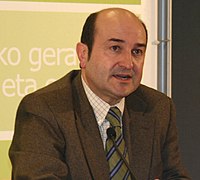Eusko Alderdi Jeltzalea-Partido Nacionalista Vasco
|
Eusko Alderdi Jeltzalea Partido Nacionalista Vasco Parti Nationaliste Basque |
|
|---|---|

|
|

|
|
| Party leader | Andoni Ortuzar |
| founding | July 31, 1895 |
| Place of foundation | Bizkaia |
| Headquarters | Sabin Etxea Bilbao |
| Youth organization | Euzko Gaztedi Indarra |
| Alignment |
Christian Democracy Conservatism Basque Nationalism |
| Colours) | green, red, white |
| Basque Parliament |
28/75 |
| Spanish House of Representatives |
7/350 |
| Spanish Senate |
10/266 |
| MEPs |
1/59 |
| European party | European Democratic Party |
| EP Group | RE |
| Website | www.eajpnv.eus |
The Basque Country National Party ( Eusko Alderdi Jeltzalea - Partido Nacionalista Vasco , EAJ - PNV ) (German: "Basque Party of Supporters of JEL / Basque Nationalist Party") is a political party in Spain with great regional importance in the Basque Country Autonomous Region . In addition to the nationalist orientation, the party is conservative-Christian. EAJ / PNV advocates greatly expanded autonomy and independence for the Basque Country ( Ibarretxe plan ). To this end, it invokes the peoples' right to self-determination and wants to hold a referendum in which the people of the Basque Country can freely decide their political future.
Since the end of the Franco dictatorship in 1975, EAJ / PNV was consistently the strongest political force in the Autonomous Community of Basque Country and also consisted of the head of government ( Lehendakari ) there until the change of government in 2009 , most recently Juan José Ibarretxe . Iñigo Urkullu has been party leader since 2007 .
In the elections to the Spanish parliament , the PNV only competes in the Basque Country and regularly achieves good results there, albeit somewhat weaker than in the regional elections. In the 2008–2012 legislative period, it is represented by six members, making it the fourth largest party. At the European level it is a member of the European Democratic Party and from 2004–2009 represented by a member of the European Parliament .
history
The Basque National Party was founded in 1895 by Sabino Arana Goiri . The long-time political leader of the party Xabier Arzalluz handed over the chairmanship to his successor Josu Jon Imaz at the beginning of 2004 after 25 years . The PNV has been the strongest force in the Spanish Basque Country since 1979 (legislative period 2005–2009: 22 seats in the Basque regional parliament) and provided the prime minister of the regional government without interruption until 2009, most recently in a coalition with the smaller parties Eusko Alkartasuna (EA) and Ezker Batua / Izquierda Unida (EB).
The Spanish Basque Country has had its own autonomous status since 1979 . In October 2003, the Basque Prime Minister Juan José Ibarretxe , a pupil of Arzalluz, presented a draft law, the so-called Plan Ibarretxe , to greatly extend the autonomy status. The aim is, among other things, the recognition of the Basque Country’s right to self-determination , an independent judiciary for the Basque Country and the right to have its own diplomatic missions outside the Basque Country. This draft law was passed in the Basque Parliament in December 2004, but rejected by the Cortes Generales in February 2005 and thus failed.
Since the battle vote for the party chairmanship in January 2004, in which Josu Jon Imaz prevailed against Joseba Egibar , who was supported by Arzalluz, the moderate wing of the party around Imaz initially gained strength within the PNV compared to the more nationalist line of Egibar and Ibarretxes. The PNV supported the Spanish PSOE minority government under José Luis Rodríguez Zapatero on various occasions and, in particular, contributed to its policy towards the Basque terrorist organization ETA . After the end of the armistice announced by ETA in June 2007, however, the conflicts between the two wings of the PNV intensified, so that the party threatened to split. On September 12, 2007 Josu Jon Imaz therefore announced his resignation from the party leadership and his retirement from politics; His successor was the consensus candidate Iñigo Urkullu , until then chairman of the PNV in the province of Vizcaya .
At the same time, the PNV's election results have gradually declined since 2004, from which the PSOE in particular benefited. In the Spanish parliamentary elections in 2008 , the socialist PSOE achieved better results than the PNV for the first time in all regions of the Basque Country. In the Basque regional elections in 2009, the PNV was again the strongest party; however, the governing coalition with EA and EB lost its majority. With the support of the conservative Partido Popular (PP), the PSOE was able to get its candidate Patxi López through as prime minister.
The Sabin Etxea, seat of the Partido Nacionalista Vasco in Bilbao
Surname
The party bears the Basque-Spanish double name Eusko Alderdi Jeltzalea-Partido Nacionalista Vasco . The Spanish part of the name ( Partido Nacionalista Vasco ) means Basque Nationalist Party and is therefore not an exact translation of the Basque part of the name Eusko Alderdi Jeltzalea . Sabino Arana, founder of the party and "father" of modern Basque nationalism, summarized his political ideas even before the founding of the party under the catchphrase " Jaungoikoa Eta Lagizarrak " ( God and ancient rights ), from which the acronym JEL developed. The followers of his ideas called themselves Jeltzale .
See also
Web links
Individual evidence


